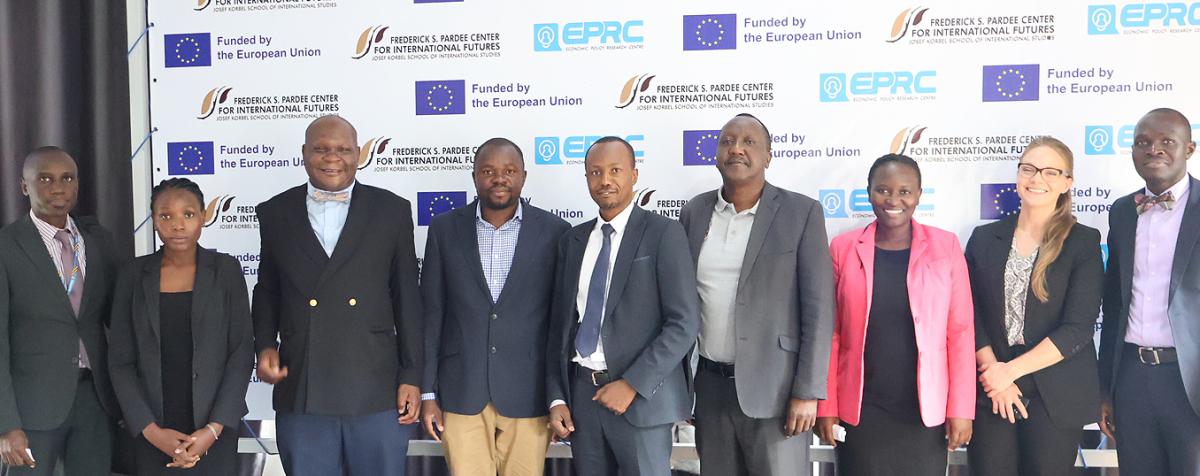Subnational Development in Uganda
Introduction
Uganda has one of the fastest-growing populations in the world, but more than one-third of the population suffers from extreme poverty. While the country’s National Development Plan sets highly ambitious goals, it is imperative that policymakers and practitioners have a better understanding of development within the country in order to make progress toward those goals. This project aims to support the Ugandan policy community by helping to make sense of the most pressing development trends happening at a subnational scale.
Funded by the European Commission, this project is a collaboration between the Frederick S. Pardee Center for International Futures at the University of Denver and the Economic Policy Research Centre (EPRC) at Makerere University in Kampala. The Pardee Center houses the International Futures (IFs) model, an integrated assessment modeling tool that has been used for development trends and scenario analysis for groups like the United Nations Development Programme and the African Union, while EPRC is one of Uganda’s most respected and trusted think tanks in development policy analysis. This partnership brings the modeling and forecasting abilities of Pardee together with the local expertise and policy connections of EPRC in order to provide vital information and analysis to further development activity in Uganda.
District and subnational analysis for Uganda is limited. Pardee constructed the first district-level estimates of GDP for the country. By building a subnational model of IFs which simulates development in 135 separate districts, this project provides new insights into Uganda’s future at a regional level. It has expanded knowledge of the effects of the COVID-19 pandemic.
Subnational Development Forecasts in Uganda
Development Trends Policy Series
Researchers from the Pardee Center and EPRC collaborated on a four-part series diving into specific policy-relevant research questions.
Potential long-term effects of COVID-19 on economic and human development in Uganda
Taylor Hanna, Deva Sahadevan, Francis Mwesigye, Paul Lakuma, Linda Nakato
Can bold investments make up for the economic damage done by COVID-19? This report looks at the long-term effects of the pandemic on economic and human development at a national level, and the potential for a transformative policy package to accelerate progress.
Potential effects of the COVID-19 lockdowns on long-term educational attainment in Uganda
Stellah Kwasi, Mohammod T. Irfan, Taylor Hanna, Linda Nakato, and Paul Lakuma
Uganda had one of the longest school closures due to COVID-19 in the world, threatening recent progress on advancing education. This report explores the possible long-term implications of the shutdown at a subnational level and how the country can bring educational indicators back to the baseline by 2030.
The effect of meeting NDP III targets for water and sanitation on child malnutrition in Uganda
Taylor Hanna, Linda Nakato, Paul Lakuma
The rate of child malnutrition has improved over recent decades, but progress is slowing and the problem is becoming increasingly concentrated in a few regions. This report examines one aspect of this multifaceted issue – poor access to water and sanitation – and how meeting targets set in the National Development Plan can alleviate child malnutrition at a subnational level.
Implications of early marriages on development outcomes in Uganda
Deva Sahadevan, Mohammod T. Irfan, Taylor Hanna, Linda Nakato, Paul Lakuma
Uganda has the 16th-highest rate of early (child) marriage in the world, a problem that all too often limits the opportunities of affected young girls. This report estimates the effect of early marriages on Uganda’s population and on girls’ education in particular
Workshops
This collaboration included several workshops to introduce and train members of the Ugandan policy community on the International Futures model.
In the fall of 2021, Professor Keith Gehring led a nine-week virtual workshop series on the model, attended by researchers from EPRC. In each weekly session, participants dove into a different subsection of the IFs model – economy, health, education, etc. – to learn more about how to navigate the model and how it works.
Following the virtual workshop and publication of two Policy Notes, a second workshop was held in person at EPRC. It featured four days of hands-on work by Makerere students and faculty as well as representatives from the National Planning Authority and the UN. Participants worked through extracting results from existing scenarios and implementing their own scenario interventions to learn more about how IFs can be incorporated into their own work.
Use IFs Now
IFs is available online, or you may download the system for use on your computer.
Related Resources
Other Uganda-related work by Pardee researchers and/or using IFs:
Acknowledgments
This website and the reports herein were produced with the financial support of the European Union. Their contents are the sole responsibility of the Frederick S. Pardee Center for International Future and the Economic Policy Research Center and do not necessarily reflect the views of the European Union

